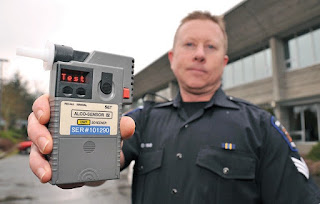Does a Cellphone User Have A Privacy Interest in the Cell Records of an Account Held By Someone Else?
Does a Cellphone User Have A Privacy Interest in the Cell Records of an Account Held By Someone Else?
This blog has been brought to you by LawyerSelect.ca
In 2013, I represented a client who was charged with fraud over
$5000. The Crown alleged that he drove drunk and hit his vehicle, and rather
than reporting the collision, he abandoned the vehicle and reported it stolen
the next day. During the course of their investigation, police obtained a
production order for the cell records of my client’s cell phone. They used the
cell tower records to show that my client wasn’t near where he said he was at
the time in question. But the phone didn’t technically belong to my client;
rather, the line was registered under his girlfriend’s name. However, he
provided police with the number to that phone when they requested a contact
number, and when asked if that was his number, he responded in the affirmative.
At all material times, my client used the phone like it was his, and made it
clear to others that it was his.
So several months down the road, and now I’m doing the trial
prep for this case. It was clear from the get-go that I was going to have to
challenge the admissibility of the production order. The Crown’s entire case
rested on the cell tower records. I drafted a section 8 Charter Application seeking the exclusion of the cell tower
records. The basis for my Charter challenge
was that the ITO failed to establish reasonable grounds to believe that an
offence has been or is suspected to have been committed and that the documents
or data will afford evidence respecting the commission of an offence. Said
another way, I argued that police didn’t have enough evidence to believe that
my client falsely reported the theft of his vehicle. They were relying heavily
on two pieces of circumstantial evidence: namely, that the car showed no signs
of forced entry, and that lose change in plain sight was left behind in the
vehicle. It was their contention that a key was used to access and operate the
vehicle, and that leaving behind lose change were actions inconsistent with
that of a thief.
So I began piecing my case together by listing all the
reasons why the ITO was deficient... But hold on, in determining whether the
evidence obtained by the police violated section 8, it must first be
determined whether the Applicant has a reasonable expectation of privacy in the
cellular telephone records… Only if and once they have established a reasonable
privacy expectation must the second step of the test be addressed, whether
the searches violated their section 8 rights by constituting an unreasonable
intrusion on their rights to privacy. So does my client have a reasonable
expectation of privacy in the cell phone records? Well, yah it’s his phone.
Well, no it’s not, it’s his girlfriends’. But he’s the phone’s exclusive user;
she’s just the account holder. Hmm… Let’s
do some case law research.
The court in R. v. MacInnis, [2007] O.J. No.
2930 found that if the cell phone is used by a person other than
the subscriber, with the consent of the subscriber, then the user has a
reasonable, subjective expectation that the information will be kept
confidential. Referring to PIPEDA, the court found that the statutory duty to
keep the information confidential creates an objective expectation of privacy
for such users. The obligations that now exist between the Applicants and their
cellular phone service providers create a contractually based privacy
expectation. The existence of that reasonable privacy expectation is
legislatively supported by Parliament's enactment of PIPEDA, which prevents the
disclosure by the service provider of personal information relating to
subscribers in the absence of lawful authority. The very enactment of PIPEDA
confirms Parliament's belief that information such as these records may be
personal and capable of being disclosed only in the presence of lawful
authority.
So does the evidence show that my client has a privacy
interest in the cell phone records? The court in R v. Edwards,
[1996] 1 S.C.R. 128 (S.C.C.), dealt with the issue of whether the accused has a
privacy interest sufficient to give him standing to object to evidence being
admitted. The court held that this must be determined on the basis of the
totality of the circumstances of the particular case. The factors to be
considered in assessing the totality of the circumstances may include,
but are not restricted to, the following:
- Historical use of the property or item;
- The ability to regulate access, including the right to admit or exclude others from the place or thing;
- The existence of a subjective expectation of privacy; and
- The objective reasonableness of the expectation.
Extrapolated to a case such as this, that test requires that
questions be asked such as whether the Applicants had a subjective privacy
expectation in the data, whether that expectation was reasonable, and whether
it was a significant or only a lower privacy expectation. The determination of
those questions must be informed by inquiries that might include whether the
information was subject to a confidentiality obligation, whether the police
technique used was intrusive in relation to the privacy interest, whether the
particular investigative technology used was itself objectively unreasonable,
and whether the data produced by the use of the technology exposed any intimate
details of the lifestyles of the Applicants or information of a biographical
nature. To that I would add that the extent of the privacy interest must be
informed by the level of statutory protection given to it.




Comments
Post a Comment